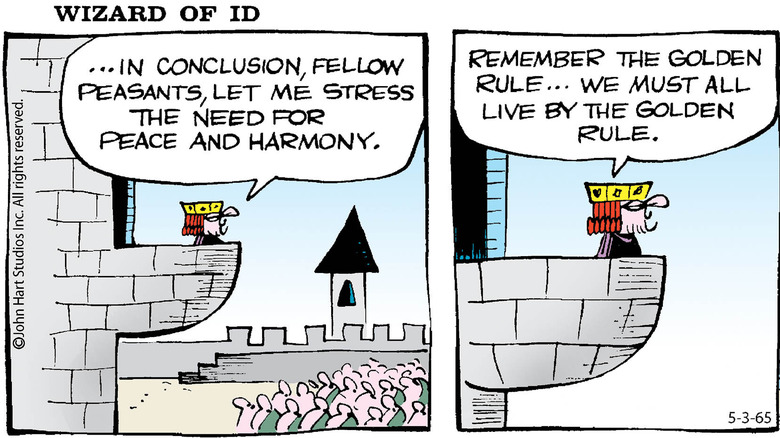The Fall Of The House Of Usher: Is The Wizard Of Id 'Golden Rule' Comic Real?
Mike Flanagan's "The Fall of the House of Usher" is a deeply moralized tale. Of course, that's expected when you're adapting the collective works of Edgar Allan Poe, whose poetry and fiction are rife with symbolism, existential questions, and evil. Flanagan has a literary bent, too, blending horror's common tropes with Shakespearean monologues and complex characters.
Flanagan's latest show is about several things. Although the series centers its harrowing story on a condemnation of the pharmaceutical industry and the opioid epidemic, it also functions as a commentary on the wild imbalance of responsibility that men and women face raising children. Perhaps above all else, it's a sharp critique of the modern billionaire class. Through the Usher family, we see the inherent corruption brought up by absurd wealth in all eight episodes of the television show.
Roderick Usher (Bruce Greenwood) is a man who obsesses over wealth and power — becoming a cruel husk of a man. His philosophy is represented in "The Fall of the House of Usher" by a comic strip he read as a young man, which was pasted outside the office of his despicable boss, Rufus Wilmot Griswold (Michael Trucco). In the strip, a king is shouting down from his castle, ordering his subjects to "Remember the Golden Rule." "What's that?" one lowly citizen asks another. "Whoever has the gold, makes the rules," another replies. {And yes, the comic is 100% real.)
The wonderful Wizard of Id
The "Golden Rule" message was typical of "The Wizard of Id," a comic created in 1964 by Johnny Hart and Brant Parker. Hart also made the successful caveman strip "B.C." Though both founding creators are dead, "The Wizard of Id" is still running today, carried on by Hart's grandchildren, Mason and Mick Mastroianni. You can read the most recent installments on its official website.
Originally, the "Golden Rule" line came a "The Wizard of Id" comic strip printed on May 3, 1965. Given the strip's overall subject matter, it's a perfect choice to be included in "The Fall of the House of Usher." The king character glimpsed in the panel is the center of the strip, which takes place in a cartoonish medieval kingdom called Id ruled by the diminutive monarch. In the comic's heyday, strips regularly tackled issues like political corruption, class disparity, and the working man's plight. Similar issues emerge from the corrupt heart of the Usher family. The ego and sense of superiority possessed by the uber-wealthy drives much of the show's plot. Thankfully, the Usher family eventually gets its comeuppance in a gnarly fashion that only Flanagan can achieve.


